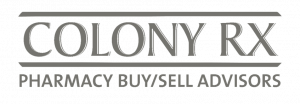Inside the Pharmacy Sale Process
By Colony RX
What does a pharmacy purchase look like, from start to finish?
In this post, I will describe the primary steps in selling and buying a pharmacy.
Step I: Sourcing
Before a buyer ever talks to a seller, before a deal even gets off the ground, the buyer and seller need to find each other. This is what we call sourcing.
During the sourcing stage, the pharmacy buyer is combing the landscape, sifting for pharmacies that have good traits, researching them, weighing risks and benefits, and using this information to decide which pharmacies to contact.
In this stage, ColonyRX on behalf of our sellers casts a wide net, and tries many different ways to reach people to tell them about the opportunity. We still find the best way is word of mouth, where we get a referral to a potential seller with someone who knows our stellar reputation in the pharmacy community.
Step II: Screening
The screening stage consists of a very high-level conversation with the potential buyer. When we have this first call, we assume the buyer knows nothing so they don’t pass based on wrong assumptions. We typically have four general things to convey:
1) What type of pharmacy dare we representing? For example, do you own a traditional retail pharmacy or a specialty pharmacy or a closed-door LTC pharmacy. In this question, we want to know where your scripts come from and what kind of scripts you dispense.
2) Where is it located? What kind of community are you in? What kind of building are you in?
3) What is your top-line revenue (gross sales)?
At the same time, we are screening the buyer. We want to know what the buyer will do with the store; what experience they have and what their financial capacity is to close.
Step II: Confidentiality Certificate
If the pharmacy buyer and Colony (on behalf of the buyer) decides to move forward, we will send a confidentiality certificate, also known as a non-disclosure agreement (“NDA”). In short, the NDA is a legal document that protects any confidential information about the business shared by the seller. For more information on this, see our blog post about Confidentiality. Sometimes we issue this earlier or later in the process depending on the buyer and the circumstances. It’s really a judgement call on our behalf.
Step IV: Due Diligence
A signed NDA kicks off the first round of due diligence (“DD”). Put simply, due diligence is the investigation of a pharmacy. In the first due diligence stage, we will ask for recent tax returns and/or financial statements. It should not take more than 10 minutes to get these documents from your bookkeeper or accountant.
Once we have this information, we will often have a more detailed phone discussion about the:
- Pharmacy Operating history
- Script mix
- Real estate/physical location
- Staff
- What the seller wants to do after the sale
- Growth opportunities
The diligence process is a two-way conversation. The primary goal of diligence is to provide a general picture of the pharmacy, communicate risks, and answer any questions.
Step V: Indication of Interest
After a cursory round of diligence, if the parties are still interested in the transaction, we ask the buyer to send an e-mail (or call us) to review key terms. We try to keep this focused on just a handful of issues: The purchase price (and terms), the key items needing further diligence and the expected timeframe to close.
Step VI: Letter of Intent
Assuming the seller and buyer agree on the general terms, we ask for a comprehensive Letter of Intent (“LOI”).
The LOI is an agreement that discloses the most important terms of a transaction. Please see our other post called “The Letter of Intent” for more details. For the purpose of this post, the LOI will usually include:
- Details on the pharmacy sale price and how it will be paid.
- Any assets that are excluded from the transaction.
- Estimate of closing date.
- List of tasks that need to be completed by closing.
- Period of exclusivity where the seller agreed to only deal with the buyer.
- Any additional areas of due diligence required by the buyer.
The LOI is, in our view, the most important milestone in the successful sale of a company. This is because, to date, virtually 100% of deals for which Colony RX has received an LOI from a well financed buyer will close. If the buyer and seller can get past this stage, in all probability the deal will close. The next steps, while necessary, are largely a formality.
Step VII: More Due Diligence
Once the LOI is signed, the buyer will request more detailed documents and other diligence from the pharmacy, and arrange an onsite visit to view the premises and meet the seller in person.
Step VIII: Finalizing The Asset Purchase Agreement
In this step, all the paperwork is completed. The parties will complete a comprehensive asset purchase agreement, finalize things involving the landlord and employees, and get the pharmacy transaction right to the finish line, except for the inventory count. In this stage, things tend to be simplified because all of the key business terms are disclosed upfront in the LOI.
Step IX: The Closing and Transition
On the evening before the closing time, the inventory of the pharmacy will be taken by a third-party company. The company is hired jointly by the seller and buyer to ensure the inventory count is accurate. The price of the inventory is based on the seller’s acquisition cost, net of rebates and discounts (this formula is something we carefully negotiate). The morning after the closing date and time, any outstanding paperwork is finalized, such as populating the Asset Purchase Agreement with the final inventory amount.
Step X: Residual Transfer Issues
Once the transaction is complete, there is still some work to be done in credentialing the pharmacy with new third-party contracts, transferring different account from the owner to the seller, reconciling accounts, etc. The vast majority of the work at this point falls on the buyer.
This overview is only general. However, At Colony RX, we feel running a very structured process is necessary to completing a transaction with minimum frustration. The reason is that by following a structured process, we are sure to catch and address issues early, avoiding expensive and time consuming negotiation of issues later in the deal process.
Contact Colony Today
Contact Colony today for a confidential, no-obligation discussion about selling your pharmacy. You will feel better after speaking with us.










